

The revolutionary truth about kids and gender identity. Social Learning Theory. Social Learning Theory (Albert Bandura) - InstructionalDesign.org. The social learning theory of Bandura emphasizes the importance of observing and modeling the behaviors, attitudes, and emotional reactions of others.
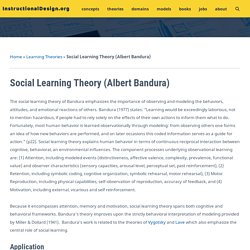
Bandura (1977) states: “Learning would be exceedingly laborious, not to mention hazardous, if people had to rely solely on the effects of their own actions to inform them what to do. Fortunately, most human behavior is learned observationally through modeling: from observing others one forms an idea of how new behaviors are performed, and on later occasions this coded information serves as a guide for action.” Gender Identity Development in Children. By: Jason Rafferty MD, MPH, EdM, FAAP There are many ways parents can promote healthy gender development in children.
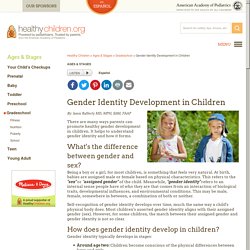
It helps to understand gender identity and how it forms. What's the difference between gender and sex? Teaching My Preschooler About Gender Identity. When it comes to gender, ideas about what it means to be a girl or a boy are everywhere, and these ideas have a big influence on your preschooler.
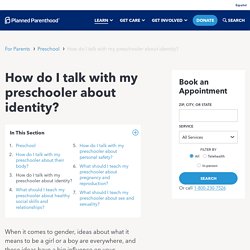
Learn how to teach your kid that their gender doesn’t limit them, how to talk about different kinds of families, how to know if your kid is transgender, and more. What should I keep in mind? Your little one is picking up messages about gender from the day they’re born. In so many ways, society tells us how girls and boys are supposed to look, speak, dress, and act. How To Talk To Young Kids About Gender.
By Nadine Thornhill I mentioned in a recent post that I’ve struggled to explain gender to my own kid (FYI who I call "The Bean").
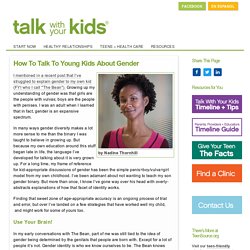
Growing up my understanding of gender was that girls are the people with vulvas; boys are the people with penises. I was an adult when I learned that in fact, gender is an expansive spectrum. In many ways gender diversity makes a lot more sense to me than the binary I was taught to believe in growing up. But because my own education around this stuff began late in life, the language I’ve developed for talking about it is very grown up.
Gender identity. Gender identity refers to the deep and intimate feeling a person has of themselves.

Children begin to understand and express their gender identity early in life. This article discusses how gender identity typically develops and how parents and caregivers can promote healthy development of gender identity and expression in children. It's important to remember that each child is unique and may develop at a different pace. What we mean by gender: Some useful definitions. 5 Simple Reasons Schools Should Teach Gender Identity. Spread the word!
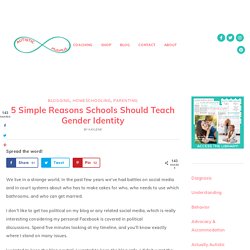
We live in a strange world. In the past few years we’ve had battles on social media and in court systems about who has to make cakes for who, who needs to use which bathrooms, and who can get married. Teaching About Gender Identity - Educators 4 Social Change. Lesbian and gay parenting: Theoretical and conceptual examinations. The publication is provided for the use of clinicians, researchers, students, lawyers, and parents involved in legal and policy issues related to lesbian and gay parenting.
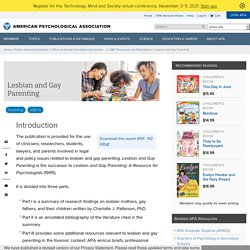
Lesbian and Gay Parenting is the successor to Lesbian and Gay Parenting: A Resource for Psychologists (1995). It is divided into three parts. Part I is a summary of research findings on lesbian mothers, gay fathers, and their children written by Charlotte J. 7 tips for LGBTQ parents to help schools fight stigma and ignorance. Many parents want to ensure that their kids are in classrooms where they and their families are respected and embraced.
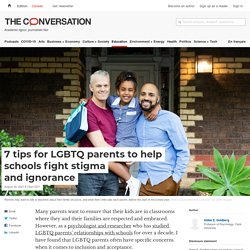
However, as a psychologist and researcher who has studied LGBTQ parents’ relationships with schools for over a decade, I have found that LGBTQ parents often have specific concerns when it comes to inclusion and acceptance. “[We have] always been very upfront that we are a family with two moms,” reported one parent in my research. “If the [school] was going to have an issue, we wanted to get the vibe early so we could find an alternative so our child didn’t have to suffer due to their closed-mindedness.” LGBTQ parents who live in less gay-friendly communities are more likely to describe feelings of mistreatment by their children’s schools. Such experiences may prompt parents to confront negative treatment.